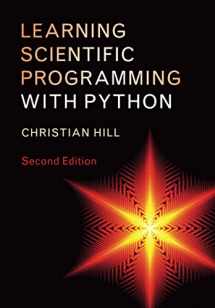
Learning Scientific Programming with Python
Book details
Summary
Description
Learn to master basic programming tasks from scratch with real-life, scientifically relevant examples and solutions drawn from both science and engineering. Students and researchers at all levels are increasingly turning to the powerful Python programming language as an alternative to commercial packages and this fast-paced introduction moves from the basics to advanced concepts in one complete volume, enabling readers to gain proficiency quickly. Beginning with general programming concepts such as loops and functions within the core Python 3 language, and moving on to the NumPy, SciPy and Matplotlib libraries for numerical programming and data visualization, this textbook also discusses the use of Jupyter Notebooks to build rich-media, shareable documents for scientific analysis. The second edition features a new chapter on data analysis with the pandas library and comprehensive updates, and new exercises and examples. A final chapter introduces more advanced topics such as floating-point precision and algorithm stability, and extensive online resources support further study. This textbook represents a targeted package for students requiring a solid foundation in Python programming.


We would LOVE it if you could help us and other readers by reviewing the book
Book review



